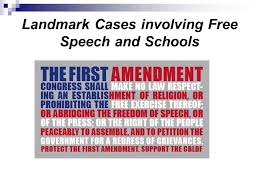 Here we go again. Another battle over prayer in the public square is really a battle about the meaning and scope of the First Amendment to the Constitution.
Here we go again. Another battle over prayer in the public square is really a battle about the meaning and scope of the First Amendment to the Constitution.
The First Amendment text reads:
“Congress shall make no law respecting an establishment of religion, or prohibiting the free exercise thereof; or abridging the freedom of speech, or of the press; or the right of the people peaceably to assemble, and to petition the Government for a redress of grievances.”
The first of the Bill of Rights has a long and storied history. Landmark Supreme Court battles have been waged over its interpretation and its scope.
In the case concerning the fired football coach there are two aspects of the First Amendment at issue here-the right to free speech and the right to freedom of religion.
Freedom of speech is the foundation on which all other 1st Amendment freedoms are based; without it the other freedoms could not exist. The purpose of free speech is to protect the minority, often unpopular, viewpoint from being overpowered by the majority, or by the government. The minority viewpoint needs to be heard because, in the long term, it may shape public opinion.
Over the years, the courts have clarified when and how speech can, and cannot, be restricted by the government.
- For example, true threats and obscenity are not protected speech
- On the other hand, provocative or offensive political opinions are protected speech
- The government can only regulate protected speech in very specific instances, such as protecting public safety or national security
The extant case involving football coach Joe Kennedy is not new. He was suspended for praying publicly in 2015. At that time, the Washington Post ran an article supporting his suspension and arguing that teachers should refrain from public displays of faith and religiosity. In the Post article, the author cited the 1963 Supreme Court Abington case in which it was declared unconstitutional to require pubic prayer in schools.
The problem with the Post’s argument is the Abington case isn’t relevant in the case involving the football coach who never required, cajoled, invited, or otherwise enticed anyone else to pray with him. He prayed as an expression of his Christian faith.
Conservatives are crying foul and criticizing the Supreme Court for not taking the case.
